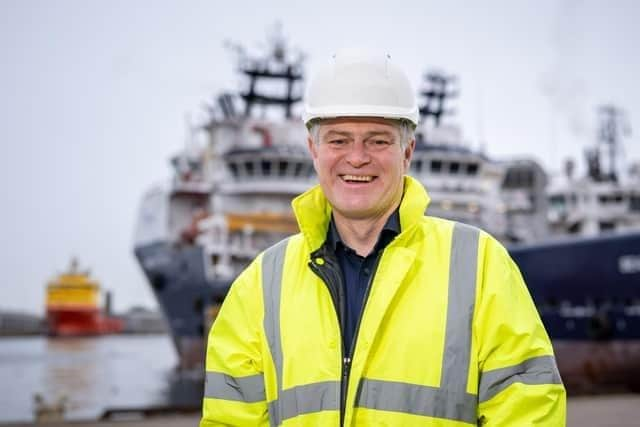Oil and gas Scotland: Green industrial revolution ‘in the balance’, says offshore industry chief, as he backs Rosebank
The prospect of a green industrial revolution is "in the balance" ahead of the general election, the chief executive of the offshore industry trade body has warned.
David Whitehouse, of Offshore Energies UK (OEUK), formerly Oil and Gas UK, said policies that undermine oil and gas would harm investment in carbon capture and wind. It came as he insisted projects such as the controversial Rosebank oil field off Shetland would create jobs and benefit companies up and down Scotland.
Advertisement
Hide AdAdvertisement
Hide AdOEUK has released a manifesto ahead of the general election, in which it says investment in homegrown oil and gas will “underpin a successful energy transition”. It said the windfall tax should be removed before 2028 to unlock investment.


The trade body has been holding emergency talks with operators and supply chain companies over Labour’s plan to extend and increase the windfall tax, which it says threatens jobs.
Speaking to The Scotsman, Mr Whitehouse said: "I think it is really clear that as we head into this general election, delivering a successful green industrial revolution is in the balance.
"The message that is in our manifesto is very clear. If we choose to do this in a collaborative way, where we make the best use of our existing industrial heritage, make the best use of our supply chain, that's the path to success.
"If we undermine oil and gas investment now, that will undermine investment in carbon storage, it will undermine investment in wind, it will undermine the very supply chain companies that we need for the UK and Scotland to take advantage of that.
"So our manifesto is very clear. We do this in a collaborative way, we accept that while we use oil and gas throughout the transition that we should prioritise domestic production, and in doing so that is the absolute platform for delivering a successful energy transition which creates jobs, value and delivers on our climate goals."
Mr Whitehouse said it “surely makes sense that we back our home-grown industries”, adding: "Fundamentally, we think the case is clear, that you should back the home-grown oil and gas sector. I think that's a platform for jobs, I think it's a platform while we have a cost-of-living crisis, I think that creates real economic value."
Asked if this includes developments such as Rosebank – the UK's largest untapped oil field, which was granted consent last year – he said: "Absolutely."
Advertisement
Hide AdAdvertisement
Hide AdAbout 75 per cent of the UK’s total energy requirements are met by oil and gas, and around 50 per cent of that demand is produced domestically, OEUK says.
Mr Whitehouse said the oil and gas sector had cut its production emissions by more than 20 per cent since 2018.
He said projects such as Rosebank “make sense”, adding: “They will be some of the lowest emission projects to be delivered in the UK. They create real jobs. There are companies up and down the UK, up and down Scotland, which will benefit from Rosebank.
"So it will deliver jobs, it will deliver real value back into the economy, and absolutely it's part of a managed energy transition."
Asked why he thinks Rosebank has attracted so much opposition, Mr Whitehouse said: "There are those who oppose any activity within oil and gas. But what we appeal to is the more pragmatic people, the more pragmatic who are the majority of those both in Scotland and the wider UK, who recognise that while we still use oil and gas and we will do for decades to come, surely it makes sense that we prioritise our home-grown production, we prioritise our home-grown jobs, and we reduce our reliance on foreign imports."
Humza Yousaf previously expressed opposition to Rosebank and accused the UK government of "climate denial". However, in recent days the First Minister has also strongly criticised Labour’s plans to extend the windfall tax.
He said there was “palpable anger” from the North Sea industry at the plans, with industry figures saying 100,000 jobs could be at risk.
Scottish Labour leader Anas Sarwar accused the SNP of being “on the side of energy giants making billions” rather than working people.
Advertisement
Hide AdAdvertisement
Hide AdOEUK’s manifesto says the “choices made this year by our politicians will be felt for decades to come”, adding: “The UK offshore energy sector has built an industry capable of creating a secure, skilled, and sustainable future. To unleash our potential and power our future, we ask those seeking to lead the next UK government to choose home-grown energy.
“If we get this right, with an attractive investment environment and a strong industrial economy, UK offshore energy companies could invest £200 billion in homegrown energy production this decade alone.
"This investment will help realise 50 gigawatts of wind, 10 gigawatts of hydrogen, while scaling at least four carbon capture and storage clusters, whilst also supporting home-grown oil and gas and meeting our decommissioning commitments. As we transition, domestic gas production means our gas prices are lower than the European average, while oil production makes money for the economy and supports jobs.”
The manifesto adds: “Parliaments may thrive on opposition and argument, particularly in an election year, but big engineering projects only succeed through collaboration. The transition to net zero will be the biggest engineering project this country has ever seen.
"It will fail if we undermine the industries, workforces and communities whose skills will be vital for building our energy future.”
Comments
Want to join the conversation? Please or to comment on this article.
